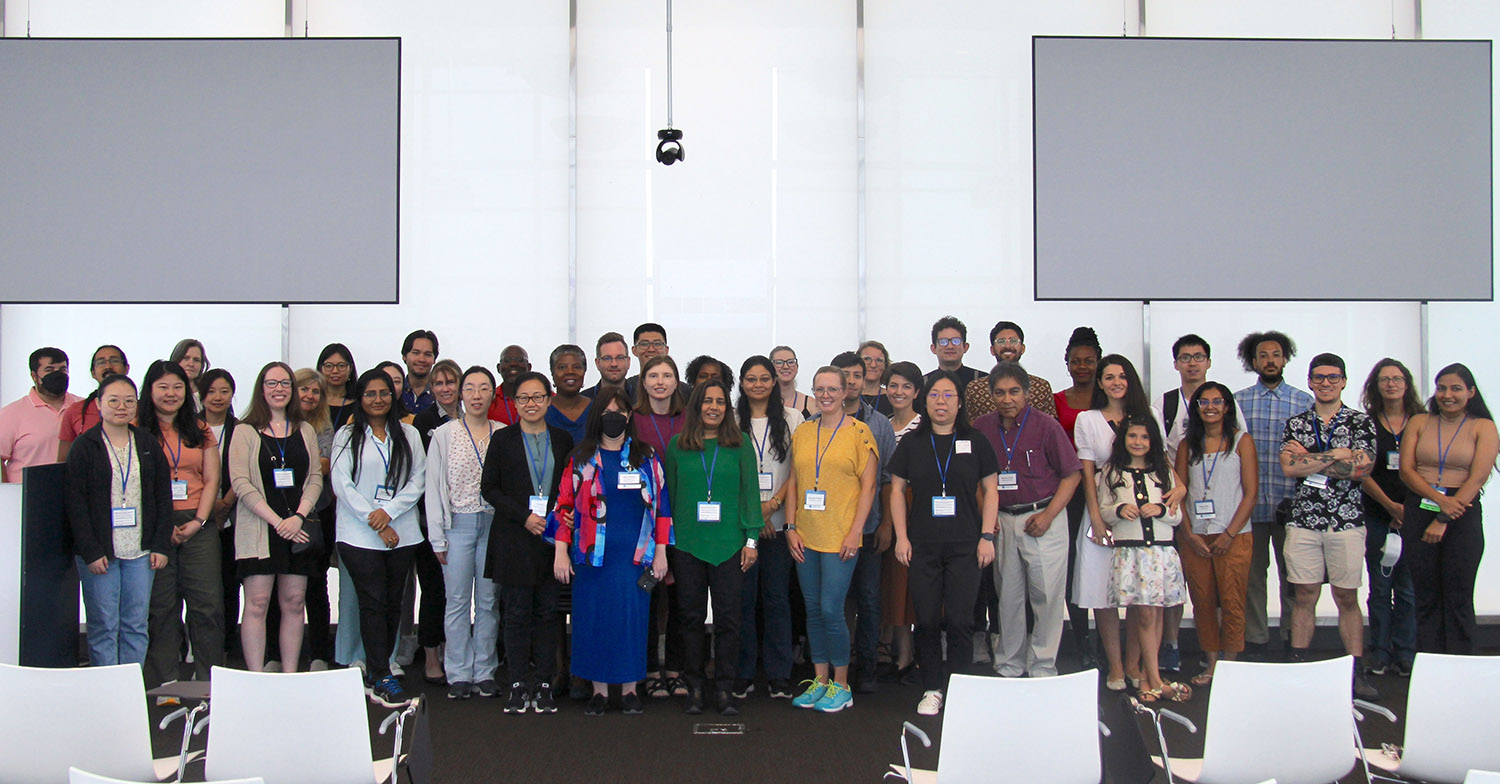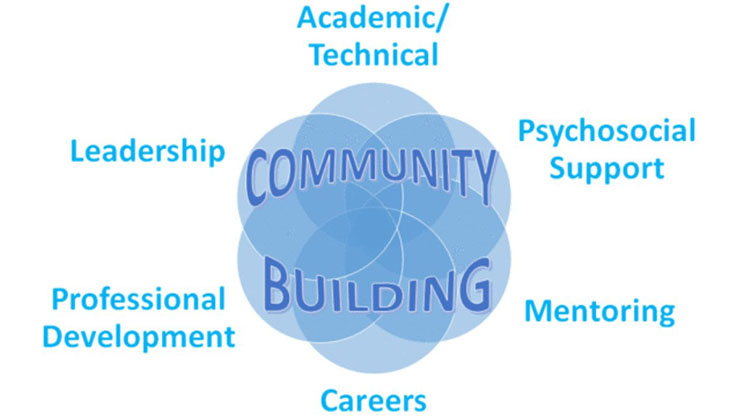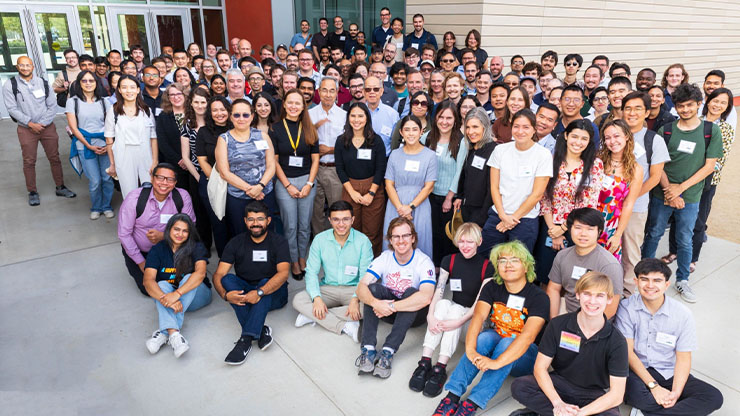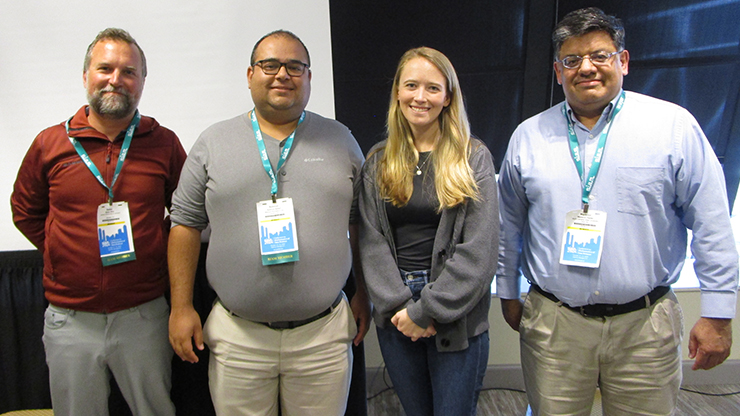ICERM-SIAM Workshop Strengthens the Computational Mathematics Research Community
Last summer, the Institute for Computational and Experimental Research in Mathematics (ICERM) hosted a workshop on “Empowering a Diverse Computational Mathematics Research Community.” This initiative, which was run in collaboration with SIAM, aimed to foster inclusivity and broad participation in the field of computational mathematics. Over the course of two weeks, more than 40 junior and mid-career attendees engaged in a variety of research, mentorship, networking, collaboration, and professional development exercises to break barriers, build bridges, form new scientific partnerships, and ultimately support groups that are historically underrepresented in the field.
Applied and computational mathematics offer an assortment of critical tools that researchers can use to tackle real-world problems. However, we feel that the field continues to face challenges in the advancement of equity, diversity, and inclusion (EDI). The workshop—which took place at ICERM’s headquarters in Providence, RI, with financial support from SIAM—sought to promote EDI in academia and industry by providing a platform for researchers from various backgrounds to share ideas, work together on projects, and learn from leaders and experts in the community. As participants, we benefited from the perspectives of experienced faculty and industry mathematicians while also incorporating our own viewpoints and experiences into the dialogue. This productive exchange of ideas between presenters and attendees influenced everyone’s views, skillsets, and future pursuits.

The workshop featured an array of activities, including keynote presentations, panel discussions, and research group collaborations. For instance, Kate Evans of Oak Ridge National Laboratory spoke about the importance of computational and applied mathematics in industry, shared key insights about employment at the national laboratories, and emphasized the value of diversity in laboratory settings. Edward Walker—a justice, equity, diversity, and inclusion consultant—led several sessions on navigating workplace challenges and suggested tactics for effective communication and conflict resolution. Walker urged participants to prioritize and convey their needs in the workplace, as it is especially important for early-career mathematicians and aspiring faculty from minority groups to prepare for difficult or unspoken situations that may arise during their professional journeys.
The workshop also involved a series of professional development events that addressed additional aspects of computational mathematics careers. For instance, a panel about effective mentorship highlighted strategies that nurture impactful mentor-mentee relationships, while a session on negotiation skills provided tools to help individuals navigate job offers and secure funding. Work-life balance was another key topic of discussion, and panelists explored various ways that busy researchers can maintain both personal wellbeing and professional productivity — especially in the early stages of their careers.
Community-building conversations, which took place directly after each presentation and panel, allowed participants to contribute their own perspectives, views, and experiences. This inclusive dynamic encouraged all attendees to listen to and learn from each other, thus promoting the exchange of ideas between graduate students, postdoctoral researchers, faculty, and industry professionals.
Because one of the workshop’s main goals was to advance substantive research in computational mathematics, the organizers split participants into seven research groups that collaboratively tackled interesting mathematical problems. Each group comprised graduate students, postdoctoral scholars, faculty members, and industry experts to foster cross-generational mentorship and knowledge exchange. The groups’ distinct themes covered a wide spectrum of topics, including the following:
- Inverse problems and uncertainty quantification in imaging applications
- Compatible discretizations for nonlinear optical phenomena
- Modeling and numerical simulation of microswimmers in confined domains
- Agnostic numerical filters based on convolution
- Stability analysis of mixed model additive Runge-Kutta methods
- Reduced order modeling for kinetic models and applications
- Low-rank tensor methods for high-dimensional multiscale multiphysics partial differential equation models.
Attendees advanced their knowledge in these respective areas while laying the foundation for future projects and publications. As a follow up to the workshop, some participants are organizing a special session at the Third Joint SIAM/CAIMS Annual Meetings, which will take place from July 28 to August 1 in Montréal, Québec, Canada. During this session, each research group will present its progress over the past year. SIAM has committed to providing travel support for one speaker per group to further the outcomes of this event.
The workshop on “Empowering a Diverse Computational Mathematics Research Community” was an invaluable opportunity for early-career scientists to deeply engage with cutting-edge research problems, cultivate new collaborations, and improve their technical and interpersonal skills. Unique professional development experiences broadened participants’ understanding of the challenges and opportunities that exist within academia and industry, and we are thankful to ICERM and SIAM for allowing us to meet brilliant minds, form lifelong friendships, and extend our academic and professional networks. Diversity has the power to drive innovation, and empowering underrepresented voices paves the way for a more inclusive research culture. This workshop served as a beacon of progress to remind the scientific world that inclusivity is not just a goal, but a necessity for a thriving future in computational mathematics, and we hope that other scientific communities will follow suit.
Acknowledgments: The success of the “Empowering a Diverse Computational Mathematics Research Community” workshop was made possible by the generosity of ICERM, with support from SIAM and dedicated organizers Vrushali Bokil of Oregon State University, Sigal Gottlieb of the University of Massachusetts Dartmouth, Fengyan Li of Rensselaer Polytechnic Institute, and Suzanne Weekes of SIAM.
About the Authors
Rafael Ceja Ayala
Presidential Postdoctoral Fellow, Arizona State University
Rafael Ceja Ayala is a Presidential Postdoctoral Fellow in the School of Mathematical and Statistical Sciences at Arizona State University. His research interests include direct and inverse problems for partial differential equations, direct and inverse scattering, transmission eigenvalue problems, and qualitative reconstruction methods.

Maurice Fabien
Assistant professor, University of Wisconsin-Madison
Maurice Fabien is an assistant professor in the Department of Mathematics at the University of Wisconsin-Madison. His primary research interests are high-performance parallel computing, numerical methods for partial differential equations, and fast solvers.
Stay Up-to-Date with Email Alerts
Sign up for our monthly newsletter and emails about other topics of your choosing.






